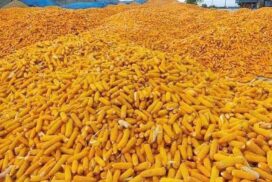In the quest for a significant share of the global coffee market, Myanmar’s business community must focus on producing high-quality coffee products. Coffee has emerged as a pivotal commodity, rivalling even oil in global importance. With 75 countries, including Myanmar, contributing to worldwide coffee production, it is imperative for Myanmar to position itself for international success strategically.
Myanmar currently boasts approximately 49,000 acres of coffee plantations, with 38,000 acres dedicated to Arabica coffee for export and an additional 12,000 acres allocated to Robusta coffee. These coffee plantations cover 60 per cent of cultivable lands in the nation. Recognizing the potential, both the government and private enterprises are collaborating to expand coffee cultivation across 300,000 acres in three designated coffee zones. This ambitious initiative is essential for Myanmar to compete with coffee-producing giants like Vietnam, which cultivates over 700,000 hectares of coffee.
The current top destinations for Myanmar’s coffee exports include Switzerland, China, Thailand, the US, Britain, Iceland, South Korea, Japan, Germany, and the United Arab Emirates. However, as Myanmar primarily exports raw coffee goods, it is crucial for local entrepreneurs to establish production facilities to contribute to the growth of coffee cultivation. This not only creates job opportunities but also addresses the issue of importing coffee products from abroad, reducing unnecessary foreign currency spending.
Myanmar’s status as a coffee exporter contrasts with its practice of importing coffee products. To counter this imbalance, businesses must prioritize the production of high-quality coffee goods, saving the country from unnecessary expenditure on imports. By closely monitoring the global coffee export landscape, Myanmar can compete with established coffee exporters, as exemplified by Vietnam’s export of 1.61 million tonnes, generating $4.18 billion in income.
Recognizing the potential of areas like PyinOoLwin in the Mandalay Region and Ywangan in Shan State, known for producing internationally recognized speciality coffee, Myanmar’s business community must strive to capture the market share for trademark and quality coffee products globally. This requires expanding coffee cultivation within the legal framework and focusing on producing finished coffee products for both local consumption and export purposes.
Currently, the time is ripe for Myanmar’s coffee entrepreneurs to strategically expand their operations strategically, emphasizing quality, trademark recognition, and increased sown acreage. Myanmar businesspersons must sustain fine results of high-quality coffee products in the international market. By doing so, they can position Myanmar as a formidable player in the competitive international coffee market.
Seek the best way to grasp firm market share of Myanmar’s coffee
- January 14, 2024
- 192















